Exiled Prince Commends Iran's Brave LGBT Activists
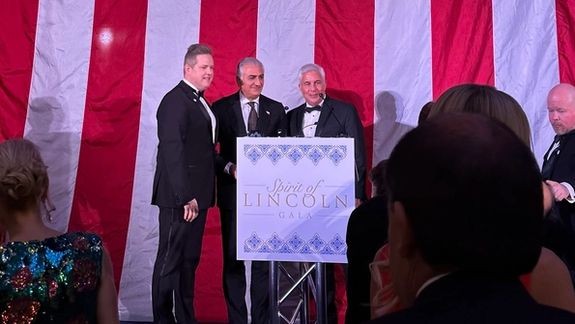
Exiled Iranian Prince Reza Pahlavi expressed his commitment to defending the rights of every Iranian, including those in the LGBTQ community.

Exiled Iranian Prince Reza Pahlavi expressed his commitment to defending the rights of every Iranian, including those in the LGBTQ community.
The prince made the remarks after being honored with the Outspoken Award from the Log Cabin Republicans, an organization affiliated with the Republican Party dedicated to advocating for equal rights for LGBTQ+ Americans.
Pahlavi emphasized his pride in standing up for the rights of the Iranian LGBTQ community. He acknowledged the courage of his compatriots inside Iran, stating that “it is my brave compatriots inside Iran who truly deserve this honor because they are not only speaking out for their freedom. They are fighting for it. And they are not only fighting to free themselves; they are fighting to free the region and the world from the clutches of this regime and to usher in a new era of peace.”
The Log Cabin Republicans (LCR), known for promoting LGBTQ+ rights within the Republican Party, presented Prince Reza Pahlavi with the Outspoken Award on Sunday.
The Iranian LGBTQ community has played a pivotal role in the Women, Life, Freedom uprising, actively participating in both domestic and international protests. Despite facing the threat of execution and other forms of punishment under the laws of the Islamic Republic, LGBTQ individuals in Iran continue to bravely confront such dangers.
Iranian authorities have, in the past, employed derogatory labels and stigmatization when addressing LGBTQ citizens, referring to them as "deviant" and "sick" based on Islamic laws that prohibit same-sex relations.

Iran is not afraid of the United States, a top IRGC general said Monday, although more than a month after the start of the Gaza war, Tehran has treaded a careful line.
Amir Ali Hajizadeh, the commander of Iran’s aerospace force claimed the US is communicating with Iran in a humble tone about preventing an escalation in the Middle East. He also repeated familiar rhetoric that “Iran is currently at the pinnacle of power and cannot be threatened.”
Hajizadeh’s defiant remarks followed a third US strike on Iranian targets in eastern Syria Sunday night, after Iranian proxy militia groups continuously attacking US bases with drones and rockets.
Following the US strike, Defense Secretary Lloyd Austin left open the possibility of more action against Iran-linked groups if attacks against American forces in Iraq and Syria do not stop.
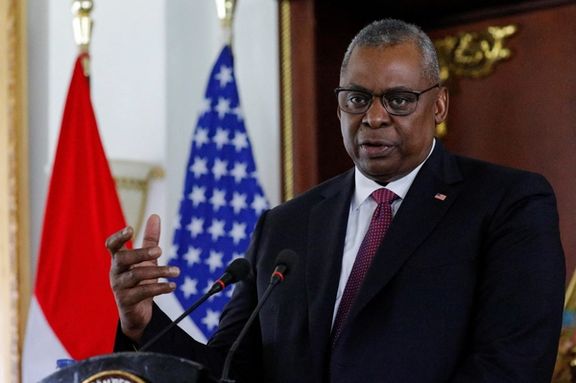
The US military’s air strike Sunday targeted a training facility near the city of Albu Kamal and a safe house near the city of Mayadeen. Iran’s Revolutionary Guard have set up a strong presence in the region, trying to facilitate the flow of weapons and ammunition from Iraq into Syria and Lebanon.
The strikes came after at least 40 attacks against US and coalition troops in Iraq and Syria by Iran-backed forces in recent weeks, as regional tensions mount over the Israel-Hamas war. At least 45 US troops have suffered traumatic brain injuries or minor wounds.
"These attacks must stop, and if they don't stop, then we won't hesitate to do what's necessary, again, to protect the troops," Austin told reporters at a news conference in Seoul on Monday.
Iran has used the tactic for years to put pressure on the US, with the ultimate goal of forcing Washington to withdraw its military forces, which would allow Iran a freer hand to project power in Iraq and Syria. Iran escalated such attacks in December 2019, before former President Danald Trump authorized the killing of Iran’s top Middle East operative Qassem Soleimani in an air strike in January 2020.
The attacks had subsided for more than a year before the October 7 Hamas terror raid into Israel that ignited the Gaza war.
Austin said the latest air strikes in eastern Syria targeted facilities used by Iran's Revolutionary Guard Corps and related groups.
"These strikes are intended to disrupt and degrade the freedom of action of these groups, which are directly responsible for attacks against US forces in Iraq and Syria," Austin said.
The United States has 900 troops in Syria, and 2,500 more in neighboring Iraq, to advise and assist local forces trying to prevent a resurgence of Islamic State, which in 2014 seized large swathes of both countries but was later defeated.
There is growing concern that the Israel-Hamas conflict could spread through the Middle East and turn US troops at isolated bases into targets of heavier weaponry than the smaller rockets and one-way drones seen so far.
The United States has deployed additional air defenses and sent warships and fighter aircraft to the region since the Israel-Hamas conflict erupted on October 7, including two aircraft carriers, to try to deter Iran and Iran-backed groups.
The number of troops added to the region is in the thousands.
Reuters has reported that the US military was taking new measures to protect its Middle East forces during the ramp-up in attacks by suspected Iran-backed groups and was leaving open the possibility of evacuating military families if needed.
The measures include increasing US military patrols, restricting access to base facilities and boosting intelligence collection, including through drone and other surveillance operations, officials say.
It was still unclear whether anyone was killed in the Sunday US strikes in Syria.
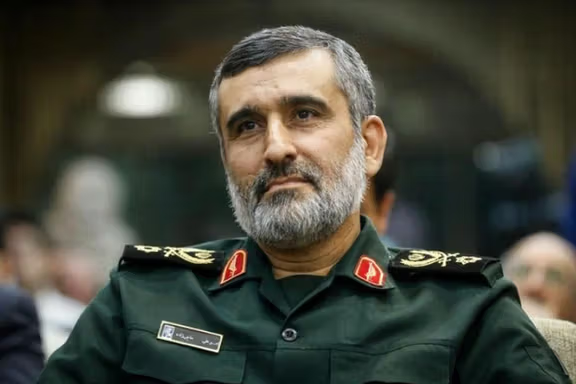
The commander of the Aerospace Force of the IRGC has declared that the US is engaging in diplomatic talks with Iran using a "language of request and plea" amid attacks on US bases.
Amir-Ali Hajizadeh claimed on Monday that “Iran is currently at the pinnacle of its power and cannot be threatened".
Since Iran-backed Hamas declared war on Israel on October 7 and the US supported Israel's right to defend itself, at least 40 proxy attacks have taken place against US bases in Iraq and Syria. On Sunday, the US ordered two retaliatory attacks. Defense Secretary Lloyd Austin said the strikes targeted Iran’s Revolutionary Guard and affiliated militia groups.
Hajizadeh also acknowledged the expanding conflict in the region, with Lebanon becoming embroiled. Hajizadeh speculated on the possibility of further escalation, stating, "The future is uncertain, but Iran is prepared for all circumstances."
The recent stance from Hajizadeh sharply contrasts with his remarks from the previous week, where he had suggested a degree of apprehension. He revealed that Iran chose not to retaliate against the US for the killing of Quds Force commander Qassem Soleimani in 2020, deeming it illogical.
A video released by Etemadonline showed Hajizadeh explaining that a war at that time could have resulted in significant casualties for Iran, both civilian and military, and set the nation back by two decades.
The decision to avoid full-scale confrontation with the US was based on the assessment that such a conflict would not yield the desired results, according to Hajizadeh.
Iranian officials continue to issue threats against the Jewish state. Iran's long standing support for groups like Hamas, coupled with its decades-long call for the destruction of Israel, adds to the complexity of the geopolitical landscape in the Middle East.
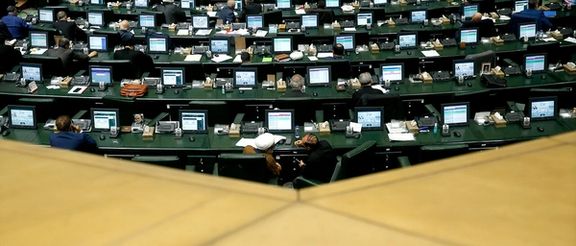
Amid public indifference, politicians and media in Iran are hotly debating the disqualification of some sitting lawmakers ahead of the March parliamentary elections.
As of Sunday, around 40 current members of parliament and several former lawmakers or top officials were barred by the interior ministry from running in the elections.
Some lawmakers, including Jalal Mahmoudzadeh, an MP from Mahabad, have openly blamed President Ebrahim Raisi's government for the massive disqualification of its critics. Others such as former lawmaker Ali Motahari have demanded explanations and insisted on their religious credentials. Yet others such as reformist Massoud Pezeshkian said, "The Interior Ministry has accused me of not believing in the Islamic Republic regime."
Mahmoudzadeh said that the government owned Iran Newspaper has been calling in the last four months for the disqualifications of politicians who have been critical of the Raisi administration.
Massih Mohajeri, the editor of the conservative daily Jomhouri Eslami, has accused the government of disqualifying critics to silence them and their criticism of the Raisi administration's failures. He claimed that 46 current and former MPs have been disqualified simply for criticizing the the adverse economic conditions and other problems created by this government. Meanwhile, he acknowledged that the Interior Ministry, which conducts the first round of candidate vetting, has significantly tightened the net to reduce the number of candidates who can pass through the qualification process.
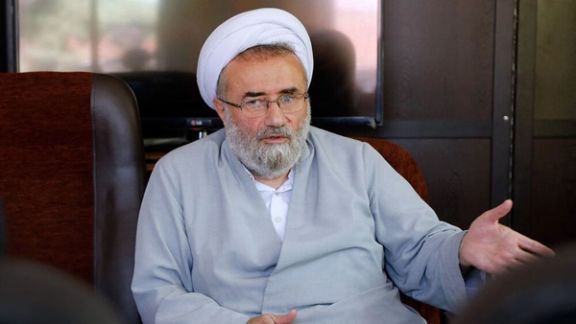
Like many other Iranian politicians, Mohajeri argued that the regime may be attempting to portray the hardliner Guardian Council, which conducts the final round of vetting, as the good cop by having the Interior Ministry do the dirty job. He pointed out that many of those who have been disqualified are regime insiders, indicating that the ruling circle is becoming tighter and smaller.
He stated that the actions of the Interior Ministry resemble the behavior one would expect from totalitarian regimes, such as the one in North Korea. He added that disqualifying this many incumbent MPs constitutes a clear violation of the Constitution. According to him, the result will likely be an even lower turnout than the previous Majles election in 2020, which was the lowest in Iran's modern history.
Mohajeri added that the Interior Ministry has admitted that it has found the critics inside the government to be acting against national security! He asked if more than 40 lawmakers do not believe in the Islamic Republic, what do you expect of them?
Moderate conservative daily Ettela'at which is usually silent about political matters in Iran, warned the government about the perils of the political purification plan which is being pursued by Iran's ultraconservatives and pointed out that the disqualification of incumbent MPs and other regime insiders is part of the same process.
Ettela'at wrote that more than 28 percent of those who had registered their candidacy have been disqualified by the Interior Ministry. Ettela'at wrote that the lawmakers who have been disqualified are precisely those who have tried during the past four years to fulfil their responsibilities. What they have done at the Majles is simply pointing out the inefficiency of government officials.
Etela'at also pointed out that because of the disqualifications, many regime insiders are now concerned about low turnout in the upcoming election. The daily told the ultraconservatives that they can still enter parliament by winning 10 percent of the votes and be proud of a 40 percent or less turnout, but the regime can no longer claim popular support.
According to Khabar Online Website, the Interior Ministry was biased against some of the candidates. The same point was reiterated by the former leader of the centrist Executives of Construction Party Gholamhossein Karbaschi. He further concluded that the government is not looking for a high-turnout election.
As one of the readers of conservative website Alef pointed out , "We voted for your friends four years ago. What did we get other than poverty, misery, and rising prices? On the other hand, conservatives do not want political participation. They lost every time the people participated in the elections." Another reader explained why the people are disillusioned: "During the past 40 years you have always called for people's participation in the months before the elections. You forget the people and their problems as soon as the elections are over."
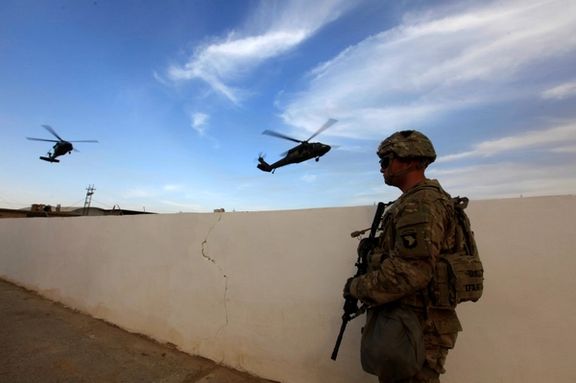
The United States carried out two air strikes in Syria against Iranian targets on Sunday, as a response to a series of attacks against American forces in Syria and Iraq.
Defense Secretary Lloyd Austin announcing the strikes said Iran’s Revolutionary Guard and affiliated militia groups were targeted.
Since the Hamas terror attack on Israel, Iranian proxy groups began targeting US bases in the region. More than 40 drone and rocket attacks were launched injuring dozens of American servicemen. Washington twice launched retaliatory attacks, but apparently neither Tehran nor its affiliated forces were deterred.
Austin said the strikes were conducted against a training facility and a safe house near the cities of Abu Kamal an Mayadin in eastern Syria, where the IRGC has a strong foothold, helping move weapons into Syria and Lebanon.
A US defense officials told Reuters on condition of anonymity that one of the targets was a weapons storage facility. The other was a "command and control" facility, which would suggest a headquarters or other staffed structure.
The official said the strikes took place around midnight local time and a US review was underway to determine whether the strikes killed or wounded any Iran-aligned militia members.
Al-Harir Airbase, located near Erbil and housing US and international forces, was targeted in an armed drone attack, as reported by a security source on Saturday.
US and international forces stationed in Iraq and Syria have heightened their alert status following numerous attacks on their bases since the October 7 terror attack on Israel.
Iran's proxies resumed rocket and drone attacks on US bases in Syria and Iraq, breaking more than a year of relative calm.
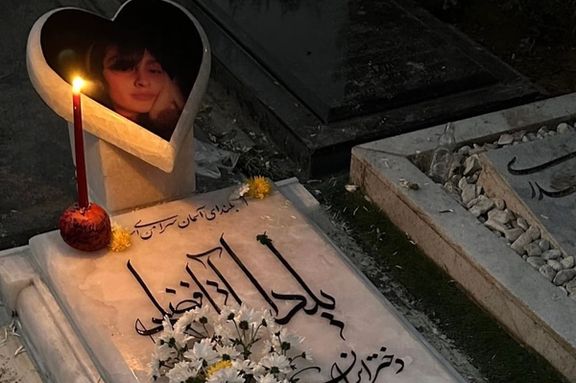
Iranian Security forces are reportedly pressuring families of those killed during protests to cancel their plans for public and even private anniversary ceremonies.
The family of Yalda Agha-Afzali, a young girl who died in suspicious circumstances at her home on November 11 last year in Tehran, five days after being released from prison, are among the families who have cancelled their plans for both private and public ceremonies without any explanation.
Mehrdad Agha-Afzali, Yalda’s father, in an Instagram post Thursday announced that all plans to commemorate her daughter on Friday as previously announced were canceled.
According to social media reports, security forces on Friday denied access, including to her family, to the section of the cemetery where the young girl is buried. A few members of the family and some supporters only managed to visit the grave after nightfall and light candles for her when security forces left.
The 19-year-old, who was arrested during protests in Tehran on October 26, went on a hunger strike at the notorious Qarchak Prison and was freed on November 6. She said she was proud she had not surrendered to pressures to accept any wrongdoing or regret for participating in protests despite having been beaten up.
After her death, authorities claimed the cause of death had been “meta-amphetamine overdose”. She was buried at Tehran’s Behesht-e Zahra Cemetery under very heavy security measures the next day.
An audio file of her conversation with a friend after her release from prison emerged on social media later -- in which she happily said she was proud she had not broken under pressure in prison – gave rise to suspicions over authorities’ explanation of her death or suicide.
The family have been under great pressure since her death by intelligence agencies. Unknown individuals vandalized her grave several times and broke her engraved stone image above it.
At least four other imprisoned young protesters – Maryam Arvin in Sirjan, Arshia Emamgholizadeh in Jolfa, Mina Yaghoubi in Arak, and Abbas Mansouri in Shoush – reportedly committed suicide within a few days after being released from prison last year.
The Pirfalak family has also been under similar pressure about holding anniversary ceremonies for their nine-year-old son, Kian, whose killing on November 15, 2022, in Izeh in southern Iran sparked nationwide outrage, earning the regime the title “child-killer”.
They were forced to hold the ceremony, under tight security measures last week, a week before the actual anniversary. Security forces prevented many who tried to attend by blocking the road.
Kian’s father, has posted a video of the low-key ceremony which shows him on a wheelchair and Kian’s mother, an a number of others, wailing at his grave.
Kian was shot multiple times in the family car during a night of protests. His father, Meysam, was also seriously injured and has been confined to a wheelchair since the incident.
Kian’s mother, Zeynab (Mah-Monir) Molaei-Rad, became a national icon of resistance after making a fiery speech at her son’s burial in which she conveyed a strong message of protest against Supreme Leader Ali Khamenei, who she says was directly responsible for her son’s killing.
The defiant family’s woes became even worse when security forces shot Kian’s 18-year-old cousin Pouya Molaei-Rad on June 11 while he was trying to break their cordon in the family’s home village of Parchestan to reach Kian’s grave to commemorate his 10th birthday.
After his death, security forces had refuse to release his body for burial for days as they demanded the silence of Kian’s mother and other family members on social media.
In the past few months Kian’s mother, once very active on social media, has been silent and rarely appears in public.
Since September 2022, when widespread anti-regime protests broke out, security forces have killed well over 500 civilians and severely wounded hundreds. Many young protesters were targeted by shotgun pellets in the face and lost one or both eyes.